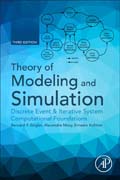
Theory of Modeling and Simulation: Discrete Event and Iterative System Computational Foundations
Zeigler, Bernard P.
Muzy, Alexandre
Kofman, Ernesto
Theory of Modeling and Simulation 3e: DEVS-Centered Foundations follows its predecessor in providing an authoritative and complete theoretical solution for graduate and PhD students and working engineers interested in posing and solving problems using the tools of logico-mathematical modeling and computer simulation. Continuing to emphasize the integration of discrete event and continuous modeling approaches, the work focuses light on DEVS and its potential to support the co-existence and interoperation of multiple formalisms in model components. The third edition focuses on important new extensions to the theory since the second edition published in 2000, including chapter-length coverage of: Iterative System Specification and DEVS: fundamental importance, closure under coupling for iteratively specified systems, existence, uniqueness, and non-deterministic conditions, temporal progressiveness (legitimacy), permeates the discussion throughout the book.System Classes and Morphisms and Abstraction: hierarchy of system specifications, associated morphisms, mappings between classes, approximate morphisms, lumpability zone characterization.Dynamic Structure DEVS: distributed simulation, dynamic coupling, agent-based modeling, implications for computational emergence.Quantized State Systems: Quantization-based simulation of continuous time systems, DEVS representation, higher order quantization, linearly implicit algorithms, activity measures, speed-accuracy tradeoffs.Stochastic DEVS: Probability spaces, legitimacy of stochastic models, formalism extensions and their properties (coupling of deterministic DEVS and DEVS Markov models, closure under coupling issues.)Hybrid Modeling and Co-Simulation: How DEV&DESS (Discrete Event & Differential Equation System Specification) and Stochastic DEVS, within a new hybrid iterative specification, support simulation within the DEVS simulation protocol.Neural Computation Domain as an illustration of DEVS-Centered M&SOpen research questions: especially for research-oriented professors and students, what are the burning questions whose answers will significantly advance theory and practice and implications for computational emergence 40% revised and expanded new edition of the classic book with many important post-2000 extensions to core theoryProvides a streamlined introduction to Discrete Event System Specification (DEVS) formalism for modeling and simulationPackages all need-to-know information on DEVS formalism in one place for busy students and engineersExpanded to include an online ancillary package including numerous examples of theory and implementation in DEVS-based software, student solutions and instructors manual INDICE: Part I: Basics 1. Introduction to System Modeling Concepts 2. Framework for Modeling and Simulation 3. Framework Refinements and Applications (V&V and Properties) Part II: System Specifications and Discrete Event System Specification (DEVS) 4. Hierarchy of System Specifications 5. Hierarchy of System Morphisms 6. Iterative Specification and DEVS - fundamental existence, progressiveness (legitimacy) 7. Dynamic Structure Part II: DEVS Simulation 8. Parallel DEVS and Abstract Simulator 9. Parallel DEVS Simulation Protocol Nutaro 10. Multicomponent DEVS and Simulator Franceschini 11. DEVS-based Simulator Speedup: Flattening (TG Kim TOMACS), Amdahl Part III: DEVS Representation of Systems: Event-based Control and Simulation 12. DEVS and DEVS-like Systems: Universality and Uniqueness (Iterative Spec) and DEV&DESS (Hybrid) 13a. Quantization, Discretization, higher order and implicit methods, activity relationship 13b. Unifying Event-based Control and Simulation: DTSS and quantization solve and combine the problems using a single formalism (DEVS) Part III: Multi-resolution families: Abstraction, Approximation, and Trade-off 14a. Stochastic DEVS, Probability spaces, legitimacy, formalism extension and their properties (closure under, coupling, coupling of DEVS and STDEVS, etc). 14b. Markov Modeling - DEVS Markov derived from Stochastic DEVS, Semi-Markov 15. Abstraction: Constructing Model Families and SES, Multi-aspects, Vectorial DEVS 16. Approximate Morphisms: Living With Error, Markov Performance Trade-off Part IV: DEVS-Based Modeling 17. DEVS and Neural Modeling, Spiking DEVS 18. DEVS and Emergence at Syntactic Level
- ISBN: 978-0-12-813370-5
- Editorial: Academic Press
- Encuadernacion: Rústica
- Páginas: 600
- Fecha Publicación: 01/08/2018
- Nº Volúmenes: 1
- Idioma: Inglés
